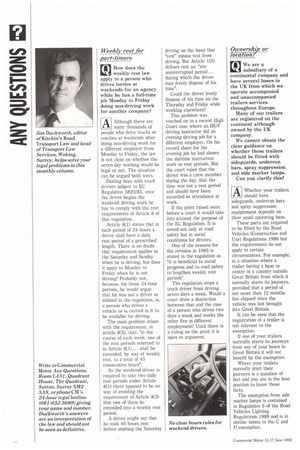Weekly rest for part-timers
Page 42

If you've noticed an error in this article please click here to report it so we can fix it.
How does the weekly rest law apply to a person who drives lorries at weekends for an agency while he has a full-time job Monday to Friday doing non-driving work for another company?
A Although there are
many thousands of peop e who drive trucks or coaches at weekends after doing non-driving work for a different employer from Monday to Friday, the law is not clear on whether the seven-day working would be legal or not. The situation can be argued both ways.
Dealing here with truck drivers subject to EC Regulation 3820/85, once the driver begins the weekend driving work he has to comply with the rest requirements of Article 8 of that regulation.
Article 8(1) states that in each period of 24 hours a driver shall have a daily rest period of a prescribed length. There is no doubt that requirement applies to the Saturday and Sunday when he is driving, but does it apply to Monday to Friday when he is not driving? Probably not, because, for those 24-hour periods, he would argue that he was not a driver as defined in the regulation, ie, a person who drives a vehicle or is carried in it to be available for driving.
The main problem arises with the requirement, in article 8(3), that: "in the course of each week, one of the rest periods referred to in Article 8(1)... shall be extended, by way of weekly rest, to a total of 45 consecutive hours".
As the weekend driver is required to take two daily rest periods under Article 8(1) there appears to be no way of avoiding the requirement of Article 8(3) that one of them be extended into a weekly rest period.
A driver might say that he took 45 hours rest before starting the Saturday driving on the basis that "rest" means rest from driving. But Article 1(5) defines rest as: "any uninterrupted period... during which the driver may freely dispose of his time".
Could the driver freely dispose of his time on the Thursday and Friday while working elsewhere?
This problem was touched on in a recent High Court case where an HGV driving instructor did an evening driving job for a different employer. On his record sheet for the evening job he had shown the daytime instruction work as rest periods. But the court ruled that the driver was a crew member during the day, that the time was not a rest period and should have been recorded as attendance at work.
If the point raised went before a court it would take into account the purpose of the EC Regulation. It is aimed not only at road safety but at social conditions for drivers.
One of the reasons for the revision in 1985 is stated in the regulation as "it is beneficial to social progress and to road safety to lengthen weekly rest periods".
The regulation stops a truck driver from driving seven days a week. Would a court draw a distinction between that and the case of a person who drives two days a week and works the other five in different employment? Until there is a ruling on the point it is open to argument.
















































































